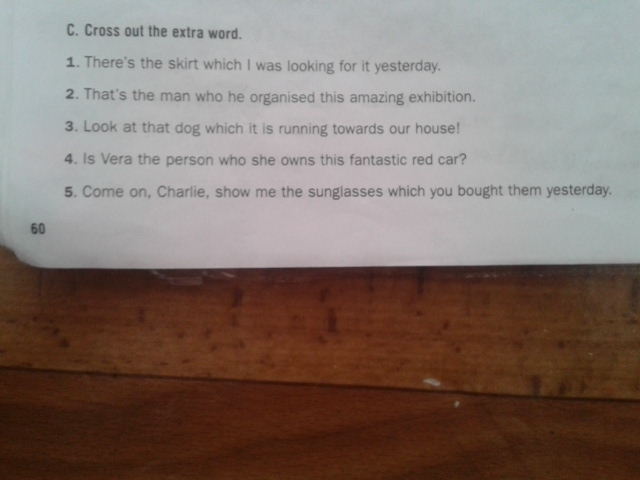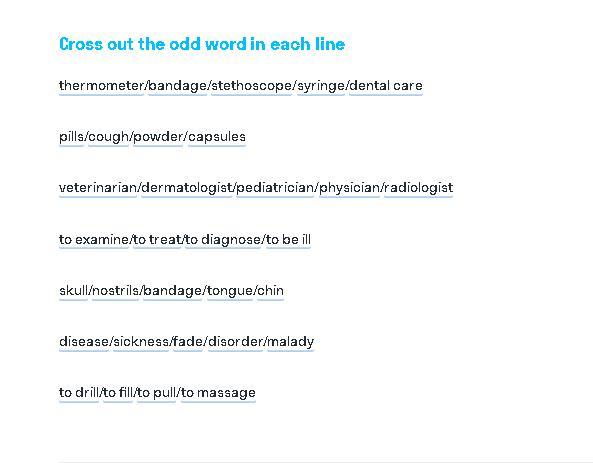UNIT 10. INDUSTRY
Vocabulary test
I. Give English equivalents to the following terms:
добыча пол. ископаемых ________________ сырье ________________________
месторождение _______________________ горная порода _________________
нефть и природный газ _________________ песчаник ______________________
сырая нефть ______________________ невосполнимые
открытая добыча угля _________________ ресурсы _______________________
подземная добыча угля __________________ перегонка (очистка) ________________
II. Match the words close in meaning (synonyms).
1. worked out a. consist of
2. deal with b. exhausted
3. include c. to be concerned with
4. affect d. take over
5. begin to control e. to be concerned about
6. require f. change
7. to be worried about g. influence, damage
8. take on h. demand, need
9. fluctuate i. start
10. environment j. try
11. attempt k. surroundings
1 ___ 2 ___ 3___ 4___ 5___ 6___ 7 ___ 8 ___ 9___ 10 ___ 11 ___
III. Rearrange the letters to form equivalents to the Russian words.
(по)следствие coeqnsnenee валюта cncreury
добыча eacrxtion бурение dnllriig
колебаться fctluuate владение oewnspihr
IV. Number each line according to the headings given in italic. Cross out an odd word in each line.
spend depend contribute focus
refer contribute object succeed
open-cast outcast underground shaft
costs outlay price profit
ownership agriculture forestry mining
crop cloth timber minerals
education manufacturing communication health
- raw materials 5. adjectives used with ‘mining’
- verbs used with the preposition ‘on’ 6. money you spend
- verbs used with the preposition ‘to’ 7. the tertiary sector includes
- verbs used with the preposition ‘in’ 8. forms of land use
V. Complimentary text
The largest consumer of fossil fuels in the world is the electricity industry. People in rich countries have an almost unlimited supply of electricity. If we need light, heat or music, we just push a button. Electricity is so cheap that few of us think about the financial cost when we turn on an electrical appliance. But there is another cost — the cost to the environment. Every time you dry your hair, cook a meal or watch television, the greenhouse effect gets a little worse and a little more acid rain is generated. We should all try to use less electricity, for example by insulating our houses, turning off the light when we leave a room and using less hot water. Burning cheap, impure coal in an inefficient power station or primitive industrial process produces much more carbon dioxide than burning high quality coal in a modern, efficient system. Developed countries are beginning to introduce strict controls on industrial carbon dioxide emission. They can afford to buy the purest fuels and invest in the most efficient technology. Newly-industrializing countries, such as India and China, have large reserves of brown coal. They would like to use this coal as a cheap fuel for industrialization. But they cannot afford the sophisticated technology that would minimize carbon dioxide emission. Perhaps the developed countries, which have been responsible for most of the greenhouse effect in the past, should subsidize the transfer of technology to the newly-industrializing nations.
Fossil fuels are running out. From the point of view of the environment, that is perhaps a good thing. But if we remain dependent on fossil fuels for most of our energy needs there will be a sudden crisis when the reserves are exhausted. We must try to develop alternative sources of energy before this crisis happens. One way of encouraging people to develop and use alternative energy is to make fossil fuels more expensive. In 1992, the countries of the European Community introduced an extra tax on fossil fuels — the carbon tax. Although the carbon tax is unpopular, most people agree that the price of a fuel should reflect its true cost — which should include the cost of damage to the environment. Some of the revenue from the carbon tax will pay for research into alternative sources of energy.
fossil fuel — a fuel such as coal or oil, made from decayed material from animals or plants that
lived many thousands of years ago.
insulating — to cover something to prevent heat, cold, noise, or electricity from passing through
it.
emission — a substance, especially a gas, that goes into the air.
subsidize — to pay some of the cost of goods or services so that they can be sold to other people
at a lower price.
-
- 0
-
Помогите пожалуйста. Find the word with the most general meaning in each line: 1.сontract, certificate, license, document, declaration. 2. computer, telephone, equipment, fax-machine, Xerox. 3.control, examine, inspect, check
4. terminal, station, port of entry, airport
5. suitcase, rucksack, handbag, box, baggage
6. camera, X-ray machine, technology, metal detector, fiberscope
7. transport, aircraft, train, truck, ship
8. duty, payment, penalty, fine, tax
9. passenger, customer, broker, trader
10. ask, answer, explain, consult, inform, communicate
-
Комментариев (0)
-
- 0
-
1 document 2 equipment 3 check 4 port of entry 5 baggage 6 technology 7 transport 8 payment 9 customer 10 communicate
-
Комментариев (0)
Cross out the extra word.
И почему вы так решили.
Срочно!

На этой странице сайта вы найдете ответы на вопрос Cross out the extra word?,
относящийся к категории Английский язык. Сложность вопроса соответствует базовым
знаниям учеников 5 — 9 классов. Для получения дополнительной информации
найдите другие вопросы, относящимися к данной тематике, с помощью поисковой
системы. Или сформулируйте новый вопрос: нажмите кнопку вверху страницы, и
задайте нужный запрос с помощью ключевых слов, отвечающих вашим критериям.
Общайтесь с посетителями страницы, обсуждайте тему. Возможно, их ответы
помогут найти нужную информацию.

Cross out the odd word in each line below. Explain your choice.
1. went — ignored — brushed
______________________
2. listened — ordered — did
______________________
3. waited — understood — made
______________________
4. opened — closed — sold
______________________
5. ran — bit — played
______________________
6. clapped — climbed — finished
______________________
7. dropped — started — invited
______________________
8. celebrated — rained — cleaned
______________________

Светило науки — 14 ответов — 0 раз оказано помощи
1. Went (неправильный глагол)
2. Did (неправильный глагол)
3. Waited (правильный глагол)
4. Sold (неправильный глагол)
5. Played (правильный глагол)
6. Clapped (при добавлении окончания «-ed» буква «p» в глаголе clap удваивается)
7. Dropped (при добавлении окончания «-ed» буква «р» в глаголе drop удваивается)
8. Celebrate (у слова celebrate на конце уже есть буква «е», так что теоретически, мы добавляем только «d» в конец, а не «ed»
Английский язык,
вопрос задал astrotyan47,
4 года назад
Приложения:

Ответы на вопрос
Ответил Sklavik
1
1. dental care
2. cough
3. radiologist
4. be Ill
5. bandage
6. fade
7. massage
Удачи, сделай пожалуйста лучший ответ 
Предыдущий вопрос
Следующий вопрос
Новые вопросы
Литература,
7 месяцев назад
.В течение двадцати лет сряду изъездил я Россию по всем направлениям; почти все почтовые тракты мне известны; несколько поколений ямщиков мне знакомы; редкого смотрителя не знаю я в лицо, с редким не…
Русский язык,
7 месяцев назад
Найдите в предложениях сказуемое и определите его тип. Объясните свое решение. 1) По этим улицам будут ходить новые автобусы. 2) Мальчишки продолжали гонять мяч. 3) Мы сразу стали тише и взрослей. 4)…
Українська література,
4 года назад
1. Село, де народився Гр. Тютюнник. 2. Професія батька письменника. 3.Після ув‘язнення батька Тютюнник живе в брата на ……. 4. Як звали тітку, яка запропонувала жити Климку у неї, коли він залишився…
Математика,
4 года назад
Ахах, может я отупела но как подписать площадь? P или S?
Литература,
6 лет назад
Как изобразил Некрасов страдание природы почему он сравнивает сребленные деревья с павшими воинами…
Математика,
6 лет назад
вычислите
модуль одна седьмая — одна четвертая модуль.
модуль четыре пятнадцатых — пять восьмых модуль.
